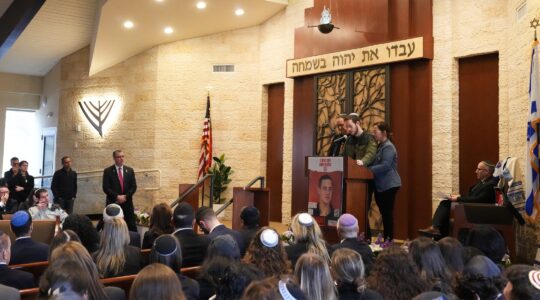
Today more than ever, I empathize with Hebrew school students. The hopeless saggy-eyed droop on my face mirrors theirs as the nation’s heatwave kicks me in the chest with unconscionable force, instructing me to stay seated and type until the bell rings. It’s not that Hebrew instruction is painful, like having your teeth pulled. It’s stupefying, like being anesthetized by your dentist for a procedure you never wanted in the first place, awakening to discover no change in your condition (save being short a couple thousand bucks and hours of free time).
Maybe I’m being naive here, but it appears that there was a time when learning Hebrew — and even learning — was way more exciting than it is today. Even harder for a YouTube junkie like me to fathom, this movement was spearheaded by literary figures.
If you were a poet, essayist, literary critic and journalist in Yiddish and Hebrew at the dawn of the 20th century, you may have been Hayim Nahman Bialik. In which case, you’d have been wildly successful beyond any modern writer’s dreams: meeting the President; running a publishing company that translated Webster’s dictionary, Einstein’s theory of relativity, and the Koran; and inspiring a movement of Hebrew-language literary circles in Tel Aviv, Havana and Buenos Aires, where streets would be named in your honor. Your heartfelt poetry would have inspired masses of Jews to willingly read and speak Hebrew — you know, for the thrill.
[[READMORE]]
When Bialik died suddenly while recovering from an operation in Vienna on July 4, 1934 (the Hebrew date was 21 Tammuz, which falls out tonight and tomorrow of this Gregorian calendar year), he was mourned and eulogized by Jews the world over. Just one year earlier, he had been honored with a major sixtieth birthday bash in Palestine — from which he managed to duck out unnoticed — and satellite celebrations in New York and all those cities that named streets after him. As a sign of a deadly tide approaching: "A celebration scheduled in Berlin at the time was cancelled at the last moment because police feared a Nazi Storm Troop attack would be made upon the Jews returning from the meeting."
Bialik excited Jews — even some U.S. students — about the Hebrew language in a way that few were able. His writing was also translated into several languages, including Arabic. He was believed to be a contender for a Nobel Prize for Literature after death, but was never awarded the distinction.
Speaking at a 1973 joint memorial program for Bialik and Theodore Herzl, Dr. Sara Feinstein, then director of continuing education for the Association for Jewish Education, offered a potential explanation of why a figure like Bialik represented during that time period and not now: "Bialik called for changing the psyche of the Jewish people who in the state of degradation lost their sense of national dignity and human courage. He rekindled the flames of the Maccabees and sparked the Jewish resistance movement."
If you know any talented young people with a knack for writing or foreign languages, try encouraging them to help the Jewish people wake from their sub-par Hebrew slumber. If that miraculously works, they can start by reading Bialik’s poetry online.
Otherwise, threaten to send them back to the dentist.
PHOTO: JTA Jewish Daily Bulletin, July 5, 1934. COPYRIGHT of Jewish Telegraphic Agency : 1922 to present is the property of Jewish Telegraphic Agency (JTA) and its content may not be copied or emailed to multiple sites or posted to a listserv without the copyright holder’s express written permission. However, users may print, download, or email articles for individual use.
JTA has documented Jewish history in real-time for over a century. Keep our journalism strong by joining us in supporting independent, award-winning reporting.





